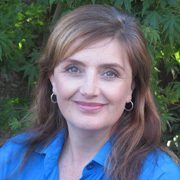
Kay Ellmers
Kay Ellmers' career in making documentaries started from a desire to highlight injustice. “Mum had a Salvation Army background and was a huge Red Cross supporter," she says. "We did a lot of door to door collecting. I come to stories with a social justice perspective”.
Ellmers was born in Auckland, then moved to the Bay of Islands. At 15, she decided to pursue journalism. After high school she headed straight to Auckland University and did a Bachelor of Arts. A Diploma in Broadcast Communications followed in 1991. Her key assignment was a documentary about youth justice in Aotearoa; it was picked up by schools as an educational resource.
After completing the diploma, Ellmers scored a job on long-running TVNZ series Marae as a researcher, reporter and director, alongside talent like Tainui Stephens. “It was early days and there wasn’t much of an independent industry... TVNZ was it”. Having become a mother, Ellmers returned as a freelancer, still working for Marae, then stepped into a director and associate producer role at Mai Time. In 1996 Ellmers was first assistant director for short film Taniwha and a researcher for Te Pahu, a documentary included on TV One’s Work of Art series.
Ellmers took a break from freelancing in the late 90s and joined the Auckland District Health Board, developing and producing Māori health education resources.
The late 90s and early 2000s were a heyday for long-form documentaries on Kiwi television, with both TV3 and TV One providing regular time slots. Ellmers directed Miss Aotearoa 2000 and Mai FM: It’s Cool to Kōrero (which told the story of Māori radio station Mai FM), both for TV3’s Inside New Zealand documentary slot. It’s Cool to Kōrero was a finalist for Best Māori Programme at the 1999 NZ Film and Television Awards.
Ellmers' documentary Her Daughter’s Voice — about singer and mother Hinewehi Mohi — was a finalist for the 2000 Media Peace Awards. In 2001 Ellmers completed the first instalments of a series of Whānau documentaries. The two-parter won Best Māori Programme at 2002’s NZ Film and TV Awards.
In 2001 she founded AKA Productions with Mohi, presenter Pio Terei. and Aroha Shelford. Soon after she began half-hour series Some of My Best Friends... Over two seasons, each episode explored a different group facing prejudice, from muslims to rappers.
In 2004 a major rift was appearing in New Zealand’s political landscape, when Prime Minister Helen Clarke and her Government passed the Foreshore and Seabed Act, placing the ownership of the foreshore and seabed into crown hands. A mass hikoi to parliament was organised, and the seeds of the Māori Party were sown. Ellmers wanted to tell the story of this historical hikoi from the inside. Hikoi: Inside Out was the result, a special for One News.
The project’s timing was fortuitous. Ellmers remembers it as "a very rare snapshot in time when TVNZ and NZ On Air were making funds — and a prime time slot — available for independent producers to make current affairs content". When she pitched the idea to TVNZ news boss Bill Ralston, she saw the documentary championing the Māori point of view. “I told him in terms of ‘balance’, we would we balancing off everything else that mainstream media was doing, and I have to give Bill credit for giving us the freedom to do that”.
From the mid 2000s to 2011, Ellmers directed or produced multiple documentaries, including The Brown Factor, a Qantas Media Award-winner for Best Sports Programme (about race, sport and Kiwi identity), Trouble With Words (about adult literacy), Tā Paora (Sir Paul Reeves) and Polynesian Panthers: The Legacy.
In 2007 Ellmers launched Auckland company Tūmanako Productions. Tūmanako began with Mīharo, a curriculum-aligned educational series for tamariki aged five to eight. Eight seasonsscreened in te reo on Māori Televison, from 2007 to 2013 — coincidentally the same year the company launched the popular Marae Kai Masters.
Around the same time, Ellmers joined Annie Goldson to co-direct He Toki Huna: NZ in Afghanistan, about Kiwi troops in Afghanistan. The one-hour documentary screened on Māori TV, then in a feature-length version at the 2013 NZ International Film Festival. In 2014 Ellmers received Women in Film and Television’s Mana Wahine Award for contributions to Māori Broadcasting. Since then she has directed Anzac Day documentary special Sacrifice on the Somme and executive produced popular warrior challenge show Game of Bros.
Ellmers thinks ‘interactive’ documentaries are on the increase. “We’re still struggling to know what interactive means, but I think we’ll be seeing a lot more documentary material treated that way. What this means for long-form storytelling remains to be seen, but I think there'll always be a place for linear documentary as humans have always loved stories that lead us through a narrative."
Asked to choose a project especially dear to her heart, Ellmers chooses Tūmanako Production’s Whānau. The once every seven years project follows the progress of four babies born in 2000, and is loosely related to Michael Apted's acclaimed documentary series 7 Up. Ellmers wanted to explore “what it is to be Māori in the new millennium”. She is looking forward to making Whānau 2021, and seeing her "four extra babies" make their 21st birthdays.
Ellmers is looking forward to her next ‘heart’ project.
Profile written by Gabe McDonnell; updated on 29 May 2020
Sources include
Kay Ellmers
Aroha Hathaway, ‘Kay Ellmers: Mana Wahine Award winner 2014 - Making it in a modern Māori MediaMaking World' (Interview) Ngā Aho Whakaari website. Loaded 3 June 2014. Accessed 10 October 2017
'Kay Ellmers' Women in Film and Television New Zealand website. Loaded 10 October 2017
'Mai FM: It's Cool to Kōrero‘ (Television Documentary) Director Kay Ellmers (Te Aratai Productions, 1999)